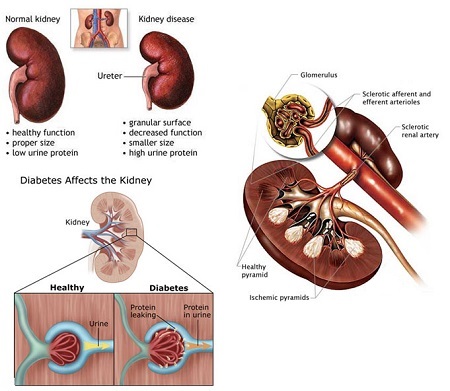Bladder pain syndrome is usually known as interstitial cystitis and this pain usually starts with an increased frequency of urine passage than a normal person. A person with BPS usually has to urinate more than 7 times a day as well as wake up at night more than once to pass urine. Pressure is created in the bladder that causes a feeling of pain That disappears after the urine is passed. In rare cases people suffer continuous pressure resulting in pain in which case check for interstitial cystitis. Although there is no cure for bladder pain syndrome, if you can meet a doctor at the urology hospital, Bangalore, he can definitely try different treatments to figure out how to improve your situation. The treatment first given starts at home where you are supposed to maintain a particular schedule in your diet and the symptoms may become better.
# Causes of bladder pain : Any kind of pain that one may sense in the pelvic area would need proper investigation as there are many causes that may cause the pain from urinary tract infection to chronic bladder inflammation.
# Symptoms : Some common symptoms of a painful bladder are frequent painful urination, lower abdominal pain, low back pain, bladder/pelvic pressure, cloudy urine, blood in urine.
# Diagnosis of bladder pain : When you have bladder pain that is intolerable, your doctor may recommend some tests : medical history, bladder diary of fluid intake and the volume of urine passed, pelvic exam for women, prostate exam for men, urinalysis to check for infection, urine function test, potassium sensitivity test, ultrasound, MRI, CT scan, cystoscope.
 Image Credit: RG Stone Urology
Image Credit: RG Stone Urology
# Treatments for bladder pain : Lifestyle changes recommended based on trigger factors for pain, like quit smoking, avoid alcohol. Dietary changes and gentle exercise can reduce stress and also relieve symptoms. Bladder training may help to hold more urine, which can be done by tracking the frequency by maintaining a diary. Physical therapy where the therapist specializes helps you stretch and strengthen your pelvic floor muscles thus relieving symptoms as well as bladder pain.
# Bladder instillation : A weekly or biweekly treatment which includes inserting a small amount of liquid containing medication and leaving it for about 15 minutes before releasing it.
# Bladder Stretching : Fluid is filled into the bladder so that it stretches, and medicine is given so as to hold the fluid and tolerate the stretching process. This method reduces the bladder pain to a certain extent.
# Transcranial magnetic stimulation : Study has found that chronic pelvic pain is reduced by repetitive transcranial magnetic stimulation, thus helping bladder pain syndrome patients get some relief in the symptoms.
# Surgery : When all the above treatments have failed to provide any relief for bladder pain syndrome, surgery is suggested. Surgery involves bladder augmentation or enlargement, a cystectomy to remove the bladder, or urinary diversion to reroute the urine flow.
# Drinks that soothe bladder pain :
Plain water – soy milk – cranberry juice – apple or pear juice – barley water – diluted squash – caffeine-free tea like fruit tea.
# Medicines for bladder pain syndrome :
Medicines like Tricyclic antidepressants such as amitriptyline or imipramine could relax the painful bladder by blocking the pain, while antihistamines such as loratadine is efficient enough to reduce the urinary urgency as well as the frequency thus relieving the symptoms.
# Who are affected by bladder pain syndrome : Both men and women can be affected by bladder pain being caused by different conditions in some cases it is more serious.
Bladder pain usually flares up during the night, the reason being you cannot distract yourself with anything else at that time of the night. The bladder pain and the frequency to urinate will not allow you to sleep well during the night and this can make you feel irritated the whole of the next day.
# Some simple ways to cope with bladder pain syndrome in the night :
- Drink enough water in the morning to help flush out bacteria
- Avoid alcohol, coffee, soft drinks containing caffeine or citrus juices.
- Drink less fluids before you sleep.
- Use incontinence pads or incontinence pants.
- Monitor how much liquid you drink and your urine output.
- Check for sleep apnea which means during night time
# Some specific reasons behind the risk of having bladder pain syndrome
- Bladder infection in the recent past : Cells are lined in the bladder to protect it from bacteria that are released during urination, the bacteria could infect the bladder causing irritation.
- Family history of bladder pain : Belonging to a family of genes which are prone to bladder pain syndrome, you maybe at the risk of getting one. Therefore do not ignore any symptoms.
- Other Reasons : Some allergies common in women with bladder pain syndrome are irritable bowel syndrome, fibromyalgia, chronic fatigue syndrome, endometriosis, and vulvodynia.
New research has shown that bladder pain syndrome could be linked to autoimmune disease especially in women, the reason being the exposure to pesticides in foods and other environmental factors. When you have bladder pain, make sure to take an appointment with a specialist at the Urology Hospital, Bangalore to make sure you are feeling better soon.



